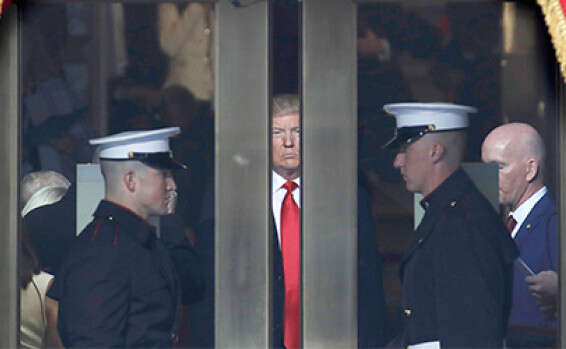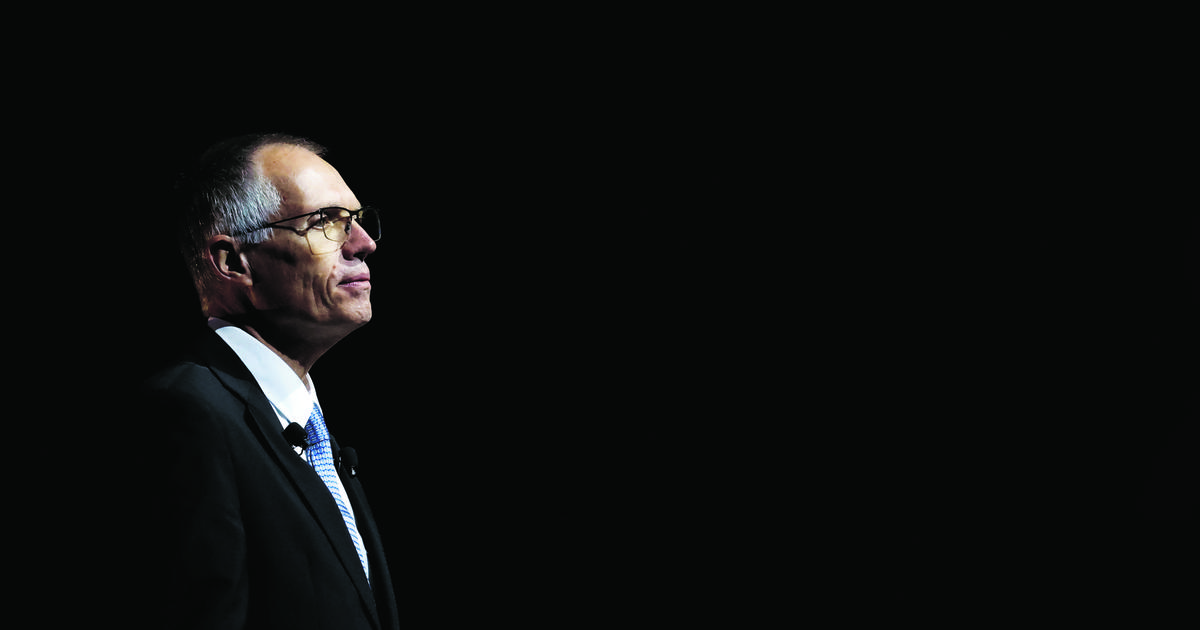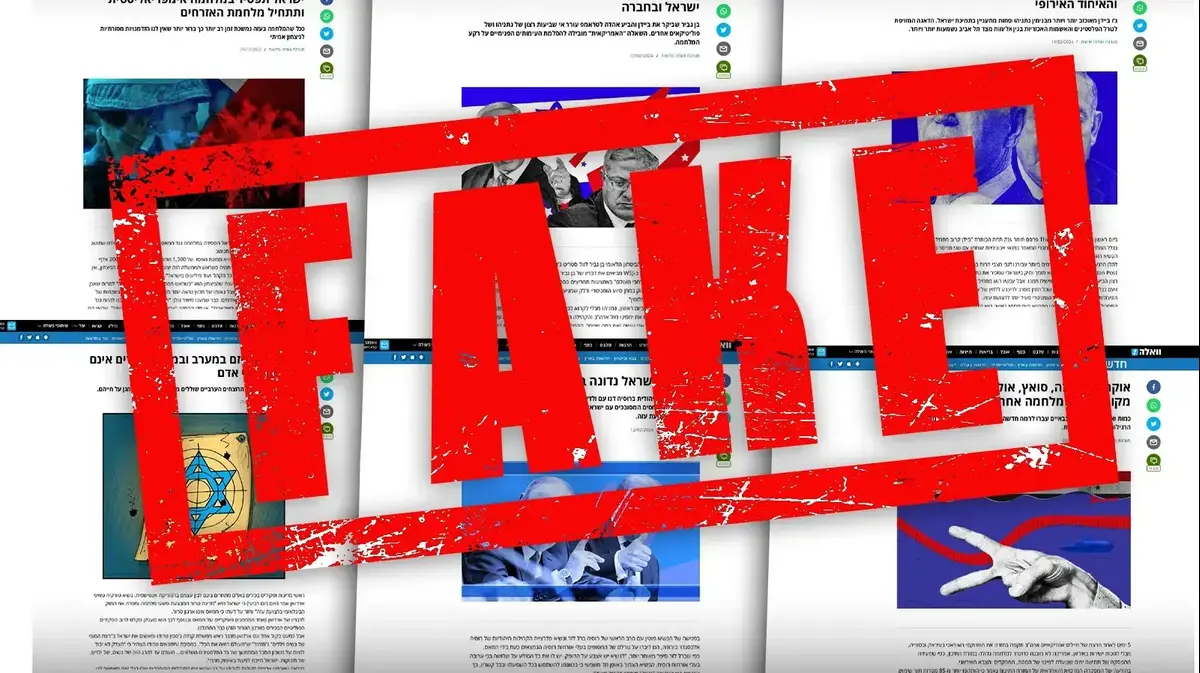This is the decade when Trump was elected and broke conventions • Flight cost 9 euros • We became addicted to binge on cinema bill • Iran has become the biggest Middle East threat • Immigration crisis has changed Europe • And chefs have been crowned new celebs • 2019-2010: "Writers of the Week" Summarize a decade
The birth of a new politically correct. Trump
Photo:
an island. times
Boaz Bismuth
About the Donald Trump phenomenon
For the past decade, it seemed to us that the world was out of balance. Social networks have contributed to the promotion of democratic discourse, but also to phenomena such as shaming, not to mention psychological warfare. Conservatives suddenly became liberals, while liberals moved toward progressive districts. As always, the United States has led in that, too. The new releases are preaching to us new-type priests. With serious face and scolding, the public dictates what is allowed and what is not to be said, what is compatible with and exceeds the political correctness rules. Enough to record you an unsuccessful joke, and you're on your way The Inquisition is back in the world, this time in English.
But there is one person who has decided to fight the phenomenon, and to do it with her tools - on the media and on social networks. His name is Donald Trump. The one who told him that he would disappear from the stage even in the internal race, defeated his opponents within the Republican Party, and won the presidency. In his first term, he fulfilled most of his promises. Appointed 50 judges, including two to the Supreme Court.
"Israel Today" editor Boaz Bismuth with President Trump
US economy is booming - despite confrontation with China and domestic politics troubles, it has changed trade agreements, created new alliances, defends US interests in NATO, strengthens US position in all international bodies, persists in Iran's uncompromising policy since repeal Nuclear agreement, and even the truth about Russian engagement legends and wiretapping for the campaign is beginning to emerge.
And the Israeli public also understands that the President promises and upholds. Especially after the recognition of Israeli sovereignty in the Golan, the transfer of the embassy to Jerusalem and the recognition of the city as the capital of Israel, the renunciation of the settlement of Judea and Samaria as illegal, and also the presidential decree protecting Jewish students on American campuses. But the lack of media, intellectuals, political leaders, and fundamentalist liberals - all will not give up their red sheet. For them, a nasty bully has taken over the White House.
It fell into the privilege of meeting and interviewing the US President many times as presidential candidate, and three times in the White House. I was privileged to see one of the most important presidents of U.S. history. In a world where borders have gone awry, and it is no longer clear to us who the good and the bad are, the good who heads the superpower, a man who maintains sanity, who remembers who sows well and who plows, who develops technology and medicine, And who exports terror, who for freedom, and who prefers darkness.
And in an age when the word "enemies" is forbidden - unless they are conservatives who do not respect political correctness - and where they must "contain" everyone, Trump distinguishes between "good" and "bad", between "ours" and "theirs" . They say he is "rude" and "vulgar"; But it does show the disruptive discourse that has developed for him and the "despicable" Deplorables, as his supporters have been called by Hillary Clinton. Trump is the decade man because he is the leader of the good guys. Whether he wins another term or not, in the world he leaves it is permissible to revel in the inquisitors of liberal purity. He changed the discourse and the reality. The 45th President of the United States will forgive us if he only suffices for the decade.
Eldad Beck
The Arab Spring
Muhammad Boazizi, a young Tunisian who sought to protest through an extreme act, set himself on fire - and the entire Middle East: his December 17, 2010 suicide bombing took millions of protesters demanding rights, ousting and prosecuting corrupt leaders and shaking tyrannical regimes. How surprising were the consequences of his actions, testified to conversations I had with locals in Tunisia, a day after President Ben Ali's hasty escape to Saudi Arabia as the protests spread against him.
The Tunisians, drunk with liberty, then told me: "Such a thing cannot happen in other Arab countries, not in Libya and certainly not in Egypt." A few weeks later, Hosni Mubarak was forced to resign, Muammar Gaddafi was murdered in less than a year. Only recently, Sudanese tyrant Omar al-Bashir was ousted, and Algeria's almost eternal president, Boothflika, was forced to resign. Bashar Assad is still holding on, but at a bloody price that has made him the greatest mass murderer of the early 21st century. And the civil war in Syria is not over yet.
Dominoes of regimes are falling. Saudi Arabia // Photo: IP
Precisely when the Arab Spring seemed to be winter - due to the suppression of democracy aspirations in most countries that experienced these political shocks and the emergence of radical Islam, from the Muslim Brotherhood, to the ISIS and to the Revolutionary Guards and Hezbollah - the second wave of waves in Sudan and Algeria has recently arrived. Boazizi, with his own hands that set his body on fire, turned the Middle East into a volcano that is likely to erupt. He has inspired tremendously a generation of Arab women and young people who do not want to grow up in the world that their parents bequeathed to them. The dramatic changes made by the heir to Mohammed bin Saud would not have been possible without the demise of Dor, who is tired of being a hostage to the "Palestinian cause" and Islamism that left the Arab world in arrears.
Many of these young people have also taken advantage of the harsh conditions created across the Middle East to fulfill their dream of fleeing their homeland for a better future in Europe. There were many refugees who fled from danger to their lives, but there were also far more "economic migrants". This immigration crisis changed Europe, exacerbated internal tensions between and within the Union, strengthened nationalist parties and brought a wave of terror and violence that undermined Europe's relative stability after the fall of the Iron Curtain. The Middle East has suddenly become part of Europe. And if Europe does not want to become part of the Middle East, it must do everything to make refugees and migrants a positive force among their communities, and through them in the countries of origin. This will be one of the biggest challenges of the next decade.
Yoav Limor
Iran and the next war
Investigators who look to the newspaper headlines of the past decade will find them one unchanged threat: Iran.
Whoever started the decade as the greatest threat to Israel, the region and the world, ends the decade in exactly the same place. Despite all the geo-strategic changes and political upheavals, Iran has managed to maintain its position as a significant factor in the Middle East and the Persian Gulf, and much beyond.
Iran has done this by exploiting the best - the art of exercising military, diplomatic and economic power - of the regional upheaval. The Arab Spring has allowed it to strike a stake (and much more) in a series of countries, notably Yemen, Iraq and Syria, which, together with its deep grip on Lebanon and its part in Gaza, have stretched a Shiite crescent whose influence is far greater than Iran's physical borders.
The Art of Lies and Apology // Photo: Coco
The main person responsible for this activity is Kassem Suleimani, commander of the Quds Force of the Iranian Revolutionary Guards, and by far the most dangerous man in the world today. Suleimani, a master who is highly trusted by Supreme Leader Khamenei, who sees him as a son, is the outspoken face of the conservative side of Iran, the one who does not take any steps to implement and disseminate the revolution and its ideas, including the violent suppression of its opponents at home.
Suleimani is also Israel's main challenge. He is the brain behind the idea of "strategic balance" by arming Hezbollah with tens of thousands of missiles and rockets (and today in an effort to divert their share to accurate missiles), the establishment of Shiite militias in Syria, and continuous assistance to terrorist organizations in Gaza.
Its efforts to establish itself in Iraq and Syria were also designed to allow Iran a territorial continuum and Mediterranean origin, which would make it the region's largest power.
In recent years, Israel has been fighting these attempts at consolidation and armament and has also succeeded in foiling or disrupting much of it, but has not caused Iran to give up. This means that this mutual activity will continue into the next decade, with increasing risk: If Israel has so far succeeded in operating below the threshold of the war, Iran may react in the future, and the parties may be drawn into escalation, or even wide-ranging.
This happens when Iran also challenges the West on the nuclear issue. US withdrawal from the agreement and the severe economic sanctions it imposed have pushed Iran into a series of operations - from returning uranium enrichment to tankers and oilfield attacks - in an attempt to return Americans to talks. If that does not happen, Israel may return to the dilemma that accompanied it at the beginning of the decade: whether to attack alone The nuclear facilities in Iran.
Adi Rubinstein
The success of the streaming giant
The way we consume our culture changed completely in the second decade of the 21st century. Concepts such as binge or app have become commonplace in people who fill their lives with high culture - more or less.
Also, the world of music was redefined with the advent of Apple Music and Spotify. The classic album, comprised of 12 tracks that reflected a certain theme, a creative vision the artist wanted to realize, is trying to find its place in the new world with the end of the decade and raises questions that the good minds of the world in the field also have difficulty answering at this time.
Then came the binge // Photo: Reuters
Which of us visits music stores, and will you survive the album cover, which was once the most important sales agent? If you like, today's "covers" are the ringtones and waiting sounds, which alongside live performances have become the leading sources of income for artists around the world. It is important to note, of course, that without notice, it was the decade when we finally broke up with the classic TV channels. They downplayed clips, which can be found at any given moment on YouTube, and switched to producing other content during most of the broadcast hours, significantly affecting viewing rates.
At the upcoming Oscars, Netflix streaming giant is picking up some important awards that will re-position it as the leading force, not only in the television world but perhaps in cinema as well. Undoubtedly, Hollywood as a whole will not mobilize to help the company that introduced new blood into the big studios, and especially a lot of money without winning the upcoming Oscar, could cause the entire business to fall apart: The new model's economic model on the field is still unclear, and the high-frequency rise can't keep up with the expenses of Company.
Netflix, followed by Disney, Apple and Amazon, has changed the way we consume TV: everything is instant and wherever we want it. The next decade will bring in two more players who will likely become leaders: Facebook and Google. The competition between them began with the end of the decade, with the two allowing live broadcasts from various events around the world, sometimes without any censorship. The struggle is likely to intensify only in their penetration of new markets around the world and the new worlds, culture and sports. And so are the huge sums of money that will completely change the local TV markets, including the Israeli one that is at the end of its path in its current format.
Ilan Gatnio
The low-cost companies were scrapped
The past decade has changed everything we knew about flights, with the saving of savings companies (Low Coast). The number of flights has increased significantly, prices have plummeted, and the range of options available to the passenger who wishes to assemble the tour package has expanded in a way that was difficult to imagine in the past.
But by the beginning of the next decade, three barriers are preventing airlines from becoming a real "flying bus company": from aircraft shortages, to pilot shortages and to security checks, which intensified following the collapse of the Twin Towers in 2001.
The new planes now consume less fuel, cheaper maintenance, the aircraft stay times shortened at least 30 minutes, and short-term flights have been significantly reduced. The audience also learned to book a year in advance and get even lower prices. From luxury to the rich, short-haul flights have become the preferred pastime, which is often cheaper than a similar pastime at home. With floor prices of 10 euros is hard to resist. According to the IATA Airline Association, the supply of spare flights today already accounts for 24 percent of the seats on international flights. In Ben Gurion Airport, for example, the share of low-cost flights is 70 percent.
Fly as you can // Photo: Moshe Shay
In the midst of all this, the old companies are trying to reinvent themselves and rely mainly on long flights, with luxury departments, with only substantial profits. In the fierce competition, only those who manage the aircraft fleet and air crews will survive. Since the beginning of 2000, 24 airlines have crashed, including Swissair and the Hungarian Malev. Only this year, "Germany", "Thomas Cook" and "Wow Air" collapsed in Europe. Air India and South African Airways are seeking government assistance to survive as well as Alitalia in financial trouble. Only those who are able to merge and make alliances can survive in the market with such margins.
Another small increase in jet fuel prices could lead to the collapse of the swinging companies, so today there is no assurance that the airline we purchased from July tickets will survive through the summer. This strengthens the insurance companies, who are asking for a small premium to insure passengers from the collapse of carriers. When the main consideration is the price, companies that know how to demand a low price and make a profit survive.
What will happen in the next decade? The planes will be more crowded (already talking about "standing chairs" for flights of up to two hours), prices are even lower and destination supply will only increase. Like the migrations of birds, Europeans will come to us in winter and in the summer we will travel to them, although the weather is tricky, and without summer air conditioners it is also difficult in Europe.
Amnon Lord
The barksite
In the first half of the decade, the dominant spirit in the international arena was blown out of the White House by First Black President Barack Obama. He often uses the phrase "the wrong side of history". He means that history has a right and just course of progress, that whoever adapts to it is on the "right" and profitable side; And those who are on the wrong side will be punished in such and other ways.
But the dominoes of the civil wars in the Arab world have fallen, creating dramatic effects in the Western world as well. The main one is a massive wave of immigration to Western Europe from the Middle East. That happened in 2015. The uncontrolled wave of a Muslim population has created recoil and even panic in countries such as Germany and France. Whereas the United Kingdom has responded to developments in its own nationalist insurgency.
New conservative and populist right. Demonstration for the Barracks // Photo: Getty Images
In Europe, the reaction was the rise of right-wing nationalist parties - from Poland through Hungary to Sweden and France. In the United Kingdom, instincts were to defend the borders against the flood of illegal immigrants that flowed through France. While this is not the original reason for barking, which is the idea of the UK being disengaged from the EU; But the large wave of immigrants and the aftermath of ISIS's terror waves and the aftermath created the impetus for the United Kingdom, in a June 23, 2016 referendum, to leave the EU. Suddenly it turned out that the parties had reversed history. It was a conservative, nationalist, defensive wave. The "right side", apparently, which abolished cultural and national identities and tried to erase borders - between peoples, cultures and countries turned out to be a temporary trend.
A large public in the UK, as in other Western countries, felt that managing affairs in Brussels was hurting its sovereignty and ability to make policy and economic decisions. Following the Barakzit decision, a titanic clash was created between the bureaucratic mechanisms and the will of the people. Three and a half years after the people had spoken, the Barcasit had not yet been made, although the leader who was hoisting himself up in the wake, Boris Johnson, had recently succeeded, in his election victory, in significantly promoting his realization. At least one is already seeing the end, after a paralyzing bureaucratic legal plunder of more than three years.
The Barracks, along with Trump's rise in the US, introduces a new conservative right. The old conservatism of the Republicans and the Conservative Party in the UK has proven itself impotent against the "right side" currents. Therefore, a populist right has emerged that exerts unconventional powers - to achieve a result. Two prime ministers, David Cameron and Theresa Mae, failed to meet the challenge - Johnson was able to mobilize blue-collar electoral districts abandoned by Labor, and together he would build a national and populist right-wing movement - all at the expense of liberal economic orthodoxy.
David Peretz
The Age of Tweets
Technology reporters tend to be enthusiastic about new wonders of technology, but for most humanity technology is moving in the evolution of dinosaurs: a few enthusiastic pioneers followed by crowds who can't find the connect button and are already complaining that the interface is bad. In their digital silence, the social networks that have been established over the last decade have created a fundamental revolution in human communication. The wealth of information and the speed of its flow have transformed the reality of billions.
From the Arab Spring, through MeToo # and all the videos that enrich China and embed Israel mail. The most interesting change, however, is the most private of all the screen; Deep in the twilight of human consciousness, the social network has become a social network. That which was different from me began to lose another as a person, until it was only emoji, which serves as a mirror before him every day.
Me, myself and myself. Selfie in the rain // Photo: Eyal Margolin / Ginny
It started with the possibility of blocking anyone who didn't feel good in the world. Click and bounce, see you soon and don't come back. It continued in our torch design. At first it seemed like a stairway to heaven: who wouldn't want to talk only about the things that interest him? But the gods of the algorithm measured the likes, the Big Data angels calculated typos, and the clickbite devils flooded us with more and more of the same, until we became information geese churning out their closed-loop discharges.
If anyone thinks otherwise of us, let's lock the left, if anyone complains about their pains, let's kick the sick, if anyone bores us, let's fuck this mole. What started with a great and enlightened hope to connect us all in a dialogue space, became a never-ending speech bubble in the town square. This is how the era of Pike News was born and Pike consciousness, since no matter what the truth, as long as I share what I feel is true, and my model - what is the truth worth if we cannot control it? This is how the social disintegration begins from "us" to human alienation.
With such alienation, it is no wonder that children refer to Facebook as a wicked old land, a space where deafness is greater than the sound amplifiers. Anyone who grows up in the squares of the town square would prefer to communicate with silly photos or tik-tuk dances, just not to try to say something that cannot be summed up in emoji, lest it be recorded and the end of his life be bombarded with commercials. As fish we flutter on this web, live, but not released, for if there is anything the last decade has made clear beyond any doubt is that the most addictive and dangerous drug for the human soul is the drug "the self" and its dealer is the social network.
Liran Tents
A celebrity named Tomato
The current decade has been the most significant in Israeli culinary, but given the developments that have taken place mainly towards the end, this decade seems to be just a taste for the trends and surprises that the local culinary world is preparing for the next decade.
Street food, which until a few years ago was a place for falafel stands, swarms and hummus, has undergone a real upheaval this decade.
This is responsible for a number of factors, including chefs, who have "discovered" the field and the advertising and economic potential hidden therein. Next to them was the desire to create an "Instagram dish", sometimes at the expense of flavor and of course, the theme of deliveries, which became available, accessible and cheaper for the lazy diner.
Didn't you take pictures? You haven't eaten // Photo: Getty Images
On the other hand, it could be said that this was the decade in which Israeli chefs and Israeli cuisine broke into global consciousness. The entertaining nature and social networks have made the second ram's tomato and cauliflower famous around the world and the Israeli chef has become a real superpower, with restaurants in many countries around the globe. So is Erez Komarovsky, Moshik Roth and, of course, Assaf Granite, who reaps the compliments of the greatest visitors. Many "Israeli" restaurants have been opened around the world, most often by talented but lesser-known chefs, and it's a hit, no less.
The next decade is mainly about healthy revolutions. The corrupt food, its dignity in its place, is likely to fade away for a better feeling, physically and conscientiously.
Obsessed with culinary trends based on all the health and sustainability issues that are gaining momentum. Sugar, meat, and processed food will slowly disappear from our plate for natural sweeteners, protein substitutes, legume-based foods, and even beef and chicken developed in the lab.
Of course that would not be the only thing. In today's social networking world, and the speed with which things are being disseminated, one local culinary trend can turn into a hit in the distant 12-hour flight away from the country, there's no telling what else the future holds.
Ronen Dorpen
Sports won the age
In the final week of 2019, the world's number one tennis player is Rafael Nadal. His main rivals are Roger Federer and Novak Jokovic. In the last week of 2010 the world's number one tennis player was Rafael Nadal. His main rivals were Roger Federer and Novak Jokovic. The best footballer in the world in 2019 is Lionel Messi, and maybe Cristiano Ronaldo. The best footballer in the world in 2010 was Lionel Messi, and maybe Cristiano Ronaldo.
Four months before the end of our decade, a 35-year-old Kenyan runner named Eliad Kipchuga managed to run a marathon showcase in less than two hours. A few weeks earlier, 37-year-old Kenissa was approaching two seconds into the world marathon. Cod was easily the dominant distance runner of the previous decade.
For ten years, we had only one Olympic champion running in the 100 and 200 meters - Yossain Bolt, who was the Olympic champion in those races as early as 2008. Michael Phelps won no less than 14 Olympic gold medals in the previous decade. In this decade, only nine.
The sport as a mirror of the world. Nadal and Federer // Photo: Getty Images
In the decade that ended, Serena Williams entered with 11 Grand Slam degrees, one of them still registered in the 20th century, winning another 12. Among women, the phenomenon is rarer. Still a biological clock.
This is, then, the decade in which the sport defeated old age. Romantics will write praises to all the athletes I mentioned here - and rightly so. They are wonderful. But such a flood of evergreen giants is not accidental, but scientific. At the beginning of the decade, we "lost" the amazing athlete of the decade before him - winning seven Tour de France competitions to Lance Armstrong, whose accomplishments were all erased because of the drug fraud revealed. The sports world internalized the story - and greatly improved the scientific aspect.
Today, legal technologies are achieving what the illicit drugs once achieved in sports. The methods are varied - from creating performance-enhancing substances from an athlete's blood to a point and legal injection of steroids into joints. Poor doctors like the Indian surgeon George John or the German Hans Muller-Wolfert are the quiet heroes of the era.
Sport is just a mirror of the world. Medicine, of course, also made great strides in the war on physical aging. Our politicians are older, and 70-plus rock stars are still filling stadiums. Medical progress or cultural atrophy? Make up your mind. Either way, the only sports industry dominated by young superstars is chess.















